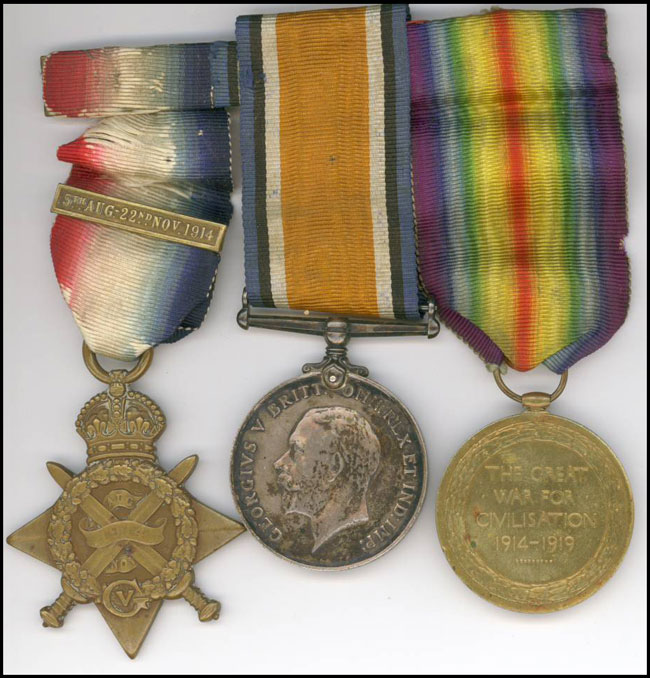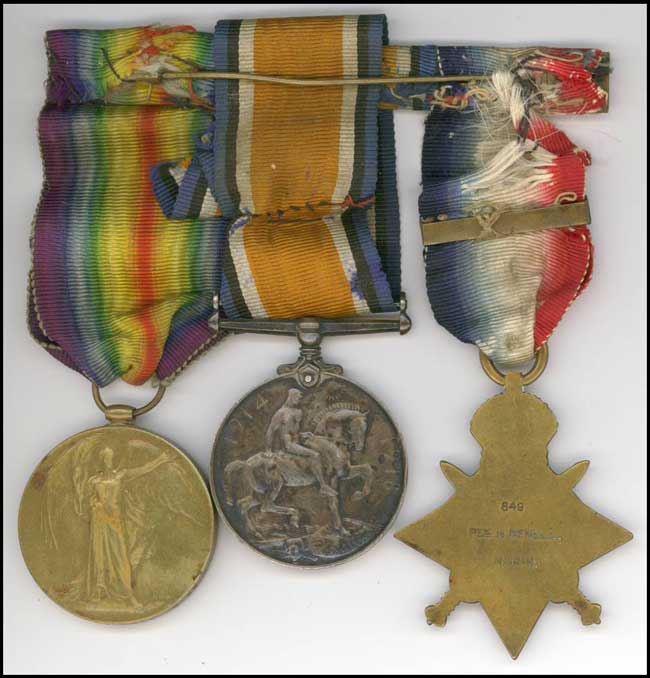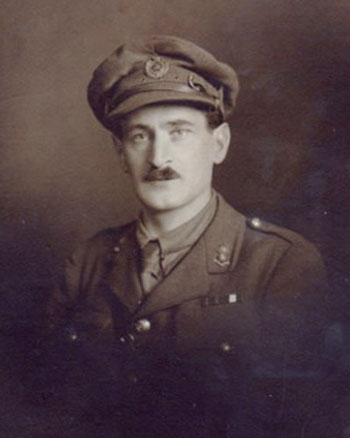Private Henry (Harry) Newell
Henry Newell was born on 17 July 1883 at Ballysaggart, Dungannon, County Tyrone, the third of eight children of butcher (later victualler) Joseph Newell and his wife Mary (nee Harding). By 1911 he was living at 38 Perry Street, Dungannon, with his parents and three brothers and working as a victualler.
Newell enlisted in the North Irish Horse between 26 April and 20 May 1913 (No.849). On the outbreak of war he was mobilised and reported for duty at the North Irish Horse depot at Belfast. The Belfast Evening Telegraph of 7 August 1914 reported that:
The departure of the local members of the North Irish Horse who have been called to the colours was the occasion of a hearty demonstration at Dungannon Railway Station on Thursday afternoon. The men were in uniform, and were escorted to the train by an armed guard of the Ulster Volunteer Force, comprising the Bush Company of the Dungannon Battalion, under the command of Mr. R. H. Scott, company officer, two of the troopers being officers of the company – viz., Mr. Wingfield Espey, half-company commander, and Mr. Isaac Carter, section leader. Mr. Harry Newell, section leader of "A" Company, Dungannon, also went off.
Newell embarked for France with C Squadron on 20 August 1914, seeing action on the retreat from Mons and advance to the Aisne. On 2 October he wrote a lengthy letter to his father, which was published in the Mid Ulster Mail a fortnight later:
I met Mr. Hall, dentist (Irish Street, Dungannon), this morning. He is with the 18th Field Ambulance Corps. He gave me this sheet of notepaper and an envelope, as I had neither. I was very glad to meet one whom I had known in Dungannon. I have not seen any of the Dungannon chaps for some time. I believe Davis (Corporal James Davis, Barrack Street, Dungannon, North Irish Horse), is with another Division, which was not many miles away a short time ago. I sent a message to him with a fellow who had lost the Division, but was returning to it. I have got no answer to it yet. Wingfield Espey (Lower-town, Dungannon, N.I.H.), is with the Division guarding the General. Lieutenant D. Williamson, V.O. (Fort Hill, Castlecaulfield), is somewhere about this village. In fact I met Mr. Hall when looking for him. If you get any information about the Dungannon chaps please let me have it, as we are quite apart. I will detail some of my wants now lest I cannot get time again and will try to have this letter franked to speed its passage home. I want another packet of post-cards, a few sheets of notepaper and envelopes, a copying-ink pencil, trouser buttons, handkerchiefs, leather boot laces, a box of good matches, a cord for Boy Scout tea-holder, and some gelatine sweets to put in tea (as milk cannot always be got, and when one gets it all the rest must share). I would like a corned tongue cooked and a black pudding cut in slices and fried, which should make it hardy enough for travelling. Some lads here got eggs from home, but they were all smashed although boiled. Almost every third soldier has lost his regimental cap and wears a khaki knitted pirate’s cap, which was served out. We got ours on the boat along with an iron-bladed knife and a Cardigan woollen jacket. We left our kit bags at Havre, and I could only take with me what I stood up in and what I managed to roll up in my top coat. I had to leave my mirror behind, but I brought my washing and shaving outfit, some extra socks, a night cap, knife, fork, spoon, &c. I can carry more stuff now owing to being in charge of a German saddle belonging to Mr. Combe (Lieutenant S. B. Combe, N.I.H., recently reported missing), which has two wallets in it. So I bought a shirt and some socks off other chaps for a few francs, as they have no money except 20-franc notes, which they cannot get changed and are "white elephants" to them.
I would like to give you a sketch of the country and my journeys, but I will wait until we are having our tea together. I will have a good reminder in the form of a diary, in which I am making rough sketches daily. On arriving in France on the night of Saturday, 22nd August, we camped out until Monday afternoon, a few miles outside the seaport, Le Havre. After entraining until Tuesday we passed through Rouen and arrived in St. Quentin, remaining there until the following night, when we left for La Fere, just in time to escape the Germans, who, according to rumour, arrived in St. Quentin but a few hours after we had left. We rode right down to the south east of Paris and within fifteen of it to a town called Tournai, where we joined the Fifth Division. All the luxuries the people possessed they showered upon us, but things changed when we turned up north again to follow the retreating Germans, for he had rid the country very well on his way. We receive regular and substantial fare, but when we cannot eat it or change its form we have to go hungry. A spoilt medico and I hold daily consultations as to how we are to manoeuvre the bill of fare, for as we follow up the Germans, and sometimes thousands of our own troops, you can guess how impossible it is to get anything to buy. Our fellows all have plenty of money, yet cannot buy matches. The French farmers do not live scattered over the country as in Ireland, but dwell in innumerable villages, where they live on potatoes, apples, nuts, and French rolls. They drink no tea, but go in for cider cups and brews which they make themselves. I will send you a recipe for one of them. If you could send me a pocket electric lamp it might come in useful when I receive a midnight call to saddle-up. I though Rouen was going to be our base and not Le Havre, and I had no idea where we were actually going when I started the train journey. Nor did I know until I had arrived, when I had to ask some of the natives. I believe we are going to get fresh kit supplied some of these days. I may be going to the Engineers to-day; if so I shall let you know immediately.
In March 1915 it was reported that Newell was "in the base hospital in France suffering from injuries to his leg, received while on active service at the Front."
Further reports were published in the local press through 1915:
Trooper Harry Newell, writing to his father, Mr. Joseph Newell, Dungannon, states that he has received a parcel of comforts, including a box of cigarettes, from Rev. John Watson, Carlingford, and who is now minister of Second Dungannon Presbyterian Church.
(Mid Ulster Mail, 17 April 1915)Mr. Joseph Newell, Perry Street, Dungannon, has received the following letter from his son, Trooper Henry Newell, of the North Irish Horse, who is at present at the front with the Head Army Staff, 1st Army Corps:– "The 'Tyrone Courier' is very illuminating in the 'Petty Session' and other corners as to men eligible for active service but who have quite made up their minds to live for their country and who doubtless feel too snug in their ‘fat job’ or ‘safe beat’ to venture into the Flanders to bear a hand in breaking up and destroying the great packs of ravenous German wolves which roam over France and Flanders and would raid also our Irish villages and make the days and nights hideous. There would be nothing fat left in Ireland, as now in Belgium, not even a fat national policeman. There would be Germans on that job! I wonder that eligible men are not ashamed to parade themselves in the limelight of the public Press. About Dungannon, I am lead to believe that the eligible receive scant respect, and I can assure you that men who have only been here since Easter have no respect for such shirkers. And men who have endured the campaign since last August have quite made up their minds that they, or rather, what is left of them, have done their own bit, and are now doing the shirker’s bit into the bargain. The South African campaign has been called a pic-nic when compared with last winter’s campaign, but that winter’s contests are as nothing to this season’s struggles and Waterloos. The pace of the war has been greatly quickened these last few weeks and the pace is likely to further increase. The present ‘greater Waterloos’ are going to be succeeded by mightier and more numerous, and more frequent Waterloos. Those who are enlisting just now don’t deserve much credit for while they are being trained war’s mightiest deeds will have been wrought."
(Tyrone Courier, 3 June 1915)Trooper Harry Newell ... returned home on Thursday from Belgium on a short leave. He had gone out with the first Expeditionary Force, and had taken part in all principal engagements since the beginning of the war.
(Tyrone Courier, 26 August 1915)Mr. Joseph Newell, Dungannon, has received intimation that his second son, Trooper Harry Newell, North Irish Horse, who has been in France since the outbreak of war, is in hospital at Cassels suffering from the effects of recent trying experiences. By a coincidence he is being medically attended to by another Dungannon man, Lieutenant Harold Sugars, R.A.M.C. Trooper Newell has two brothers – Lieutenant Charles Newell, R.E., and Sergeant John Newell, 6th Inniskilling Dragoons – also at the front.
(Belfast News-Letter, 24 November 1915)Trooper Harry Newell, North Irish Horse, son of Mr. Joseph Newell, merchant, Dungannon, has returned home on leave owing to illness contracted in France. He went abroad with the First Expeditionary Force at the beginning of the war.
(Belfast News-Letter, 29 December 1915)
Newell recovered and returned to his regiment in the new year.
In June 1916, C Squadron joined with F Squadron and the 6th (Inniskilling) Dragoons Service Squadron to form the 2nd North Irish Horse Regiment, serving as corps cavalry to X Corps until September 1917, when the regiment was disbanded and most of its men were transferred to the 9th (Service) Battalion, Royal Irish Fusiliers – renamed the 9th (North Irish Horse) Battalion. Like most of the men, Newell was transferred on 20 September. He was issued a new regimental number – 41439.
He probably saw action with the battalion at the Battle of Cambrai in November and December 1917, and perhaps also during the German spring offensive in March and April 1918, and the Advance to Victory Offensive from August 1918.
After the war Newell returned to Dungannon, later working as the town rate-collector. He died at Dungannon on 29 September 1952. The Northern Whig and Belfast Post published the following obituary:
Mr. Henry Newell, who retired recently from the position of rate collector of Dungannon Urban District, died suddenly at his home Dunard, Circular Road, Dungannon, last night.
In early life he had served with the North Irish Horse and when the First World War broke out he and three brothers joined up. He served right through the war. He was appointed urban rate collector in 1924 and retired in March last.
His eldest brother Captain Charles Newell, R.E., was killed in action in 1916 [sic]. Another brother, Mr. John Newell, recently retired from the position of assistant county surveyor, Tyrone.
Mr. Henry Newell was a P.M. of Masonic Lodge No. 185, Dungannon, and P.M. of Dungannon L.O.L. No. 1620 and R.B.P. No. 52. Surviving him are his wife and one son, Ian, who is a student at Queen's University.


Newell's service medals
Two of Newell's brothers also served during the war. Captain Charles Newell of the Royal Engineers died of wounds in France on 24 March 1918. John Newell served in the 6th Inniskilling Dragoons (Service Squadron) until commissioned in 1917 and posted to the Sherwood Foresters and Machine Gun Corps. The other surviving brother, Robert Lancelot Harding Newell, who worked at the Inland Revenue officer in Dundalk, "had also volunteered for active service, but his department could not spare him". (Tyrone Courier, 9 September 1915).

Captain Charles Newell
Some of the above newspaper articles sourced from the Dungannon War Dead site, together with the image of Charles Newell, provided to the site by Wayne Starr. Medal image Copyright © Phillip Tardif with all rights reserved as set out in this Use of Material policy.
